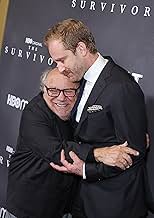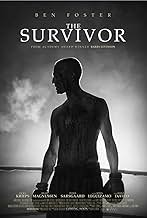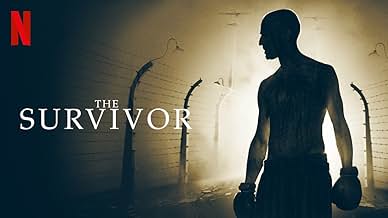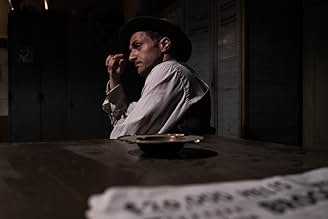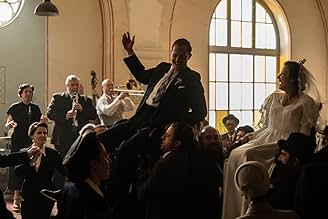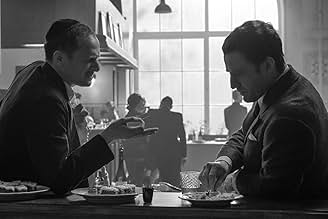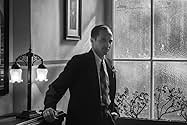Harry Haft est un boxeur qui a combattu ses codétenus dans les camps de concentration pour survivre. Hanté par sa mémoire, il tente d'utiliser des combats contre des légendes de la boxe pour... Tout lireHarry Haft est un boxeur qui a combattu ses codétenus dans les camps de concentration pour survivre. Hanté par sa mémoire, il tente d'utiliser des combats contre des légendes de la boxe pour retrouver son premier amour.Harry Haft est un boxeur qui a combattu ses codétenus dans les camps de concentration pour survivre. Hanté par sa mémoire, il tente d'utiliser des combats contre des légendes de la boxe pour retrouver son premier amour.
- Nommé pour 1 Primetime Emmy
- 2 victoires et 8 nominations au total
Histoire
Le saviez-vous
- AnecdotesBen Foster lost 62 pounds to portray Harry Haft during his time in Auschwitz. He then gained 50 pounds during a five week break to portray Harry in 1948.
- Citations
Emory Anderson: So, you were taken to Auschwitz in 1943. Auschwitz-Birkenau it became. And you survived there for six months. Now, most people didn't last more than a month or two. Look, there's always more than one side to a story. I want everyone to know yours. Whatever it is... you can't shock me.
- ConnexionsReferenced in Maldito clásico: Alpha dog es un maldito clásico (2024)
- Bandes originalesMein Shtetele Belz
Written by Aleksandr Olshanetsky and Jacob Jacobs
Performed by Svetlana Kundish / Klezmer Band
"The Survivor" is based on the incredible true story of Harry Haft (Ben Foster), who after being sent to Auschwitz, survives not only the unspeakable horrors of the camp, but the gladiatorial boxing spectacle he's forced to perform with his fellow prisoners for the amusement of his captors. Unbeknownst to those who try to destroy him, Haft is driven by the most important reason any man has to survive, a quest to reunite with the woman he loves. After a daring escape, he makes his way to New York, where he succeeds in using his boxing skills to establish a name for himself in the hopes of finding his one true love. His indomitable spirit lands him in the ring with boxing legends like Rocky Marciano (Anthony Molinari) as he fights to make sense of his past and reclaim the life that was stolen from him.
Harry's story begins in Belchatow, where he's in love with the spirited Leah (Dar Zuzovsky). As he later toils in the concentration camps, Harry is tortured by the uncertainty of what has become of Leah, last seen two years ago being hauled away by Nazis. Leah as someone who chose to be optimistic by choice, not circumstances. A small boy lies awake at night, curious and frightened by the moans and muffled cries emanating from the man fitfully sleeping across the hall. He mumbles in an unfamiliar language and seems to be recalling a horrific experience. Not until many years later does the boy learn the reason for the tormented man's nightmares. Every night he tossed and turned and screamed in horror. It's a seminal experience and it really stayed with us, but in those days no one talked about things, and we never even knew who he was. The opening at the camp is a 1940s' black and white photojournalistic style with lots of hand-held shots, as if we're just picking up moments that we happen to catch. Harry's memories are jagged and rough, with no true continuity.
Nazi camp commander Dietrich Schneider (Billy Magnussen) is an educated man whose intellect makes his depraved indifference to human suffering more acute. He relishes the pain he inflicts. Schneider runs dog fighting but, to him, the dogs are Jews. Schneider is a sick puppy. In the film, Schneider enters Haft's life after he intervenes to save his friend Jean (Laurent Papot) from a camp guard (Hans Peterson). Sensing the aggression in Haft, Schneider recruits him to compete against other Jewish prisoners in weekly boxing matches. Schneider's motivation is to entertain German officers and earn him some Reichsmarks betting on the fights. In exchange, Haft will receive special rations and privileges. Out of desperation and the sheer will to survive. Haft is moved to the infamous Polish work camp, Jaworzno. There, Harry receives crude boxing instruction from Schneider and begins a series of fights. There's a huge price to pay for his compliance. With every fight Harry wins, he sends another man to his death. Each fatality adds to his guilt and shame. As a prisoner, Harry's boxing skills allow him to survive from week to week. Against all odds he makes it out of the camp with a skill that he uses to try and escape the memories of the atrocities that colored his past.
When the story shifts to New York in 1949, we've more color entering the frames, but within that period style of film noir. And he finds everything else along the way. Living in a low-rent apartment in Brooklyn, Harry boxes with a relentless ferocity, no longer to keep his body alive, but his heart. This is not a quest for glory or ego. The Pride of Poland is fighting for love. With each bout, win or lose, Harry is fighting for attention. He wants his matches noted in the papers, his name mentioned in the streets. Essentially, his life after war is a journey to find Leah. In his search, Harry comes to rely on Miriam Wofsoniker (Vicky Krieps), who works for the Displaced Persons Service, a government office dedicated to reuniting immigrants with missing friends and family. Like Harry, Miriam knows what it means to lose a loved one, having lost her fiancé to the war. An increasingly frustrated Harry has been haunting the office for weeks, anxious for news. Miriam's empathetic kindness and gentle manner calm Harry, and the two form a bond over mutual loss. She's not looking for a fairy tale romance. Miriam is able to say 'yes, you can love more than one person. Even with Miriam's help, Harry struggles to assimilate in a new land.
As the story concludes in Florida in the 1960s, the palette is distinctly brighter and warmer, with lots of pastel tones. But even in this sunny environment, the darkness from the past manages to cast a lengthy shadow. Harry Haft's struggle against the forces of evil is reminiscent of where, if left unchecked, we could end up. His older brother Peretz (Saro Emirze), by contrast, has a much easier time adjusting to life in Florida, finding love, work, and becoming part of the community. Peretz learns to read and speak English quite well, which helps him integrate into society much better than his brother. He's concerned that Harry continues to live in the past. 'Put it away', he tells him. 'Don't dwell on it'. 'Leah is the past, let her go, let it all go'. But he can't. Peretz feels responsible for Harry. Peretz is injured along the death march and wants Harry to abandon him, but he refuses. Harry risks his own life to get his brother out. It was a tremendous act of love, and for the rest of his life Peretz tries to repay that debt by looking after him. Harry enables his manager Louis Barclay (Paul Bates) to arrange a match with the hardest hitter in the sport, Rocky Marciano. Harry is excited and confident that a victory over Marciano will lead to finding Leah. After losing to Marciano, Harry retires from boxing. He marries Miriam, but happiness continues to elude him. The smallest detail, such as the peephole in the hotel room where he goes for his honeymoon, plunges him back to his time in the camps. His failure to reconcile with his past begins to threaten his relationship with his son, Alan (Kingston Vernes)
Spanning three decades and two continents, it's both the story of Harry Haft and that of so many people who are forever colored by the events of their past as they strive to not only to survive, but to live. It's a story about survivors that had to make difficult choices to try and understand what that might have been like. What abject circumstances forced a person to do to survive. The goal is to wrangle this very complicated life and complex man into a form that would be respectful of his experience and illuminate the spirit of how and why he survived. What means it being forever haunted. How does it color your relationships with your wife and with your kids? The film wants to explore the struggle of hiding so much about your past so that those you love never know about the things you're exposed to because you want to try and protect them.
Though the film touches on great difficulties, it's one that suggests hope. The faith in finding your true love and remembering the past while finding a new kind of peace today. We are bombarded with images that remind us of the hate that exists in the world. We've always been curious about exploring the idea that when someone experiences something like a war or a concentration camp they don't just leave the experience and get on with their lives. Today, with anti-Semitism and systemic racism at an all-time high. The saying about those who do not remember history being condemned to repeat it, is more apt today than at any time. This is not a concise history but rather the traumatized, disjointed and sometimes abstract recollections of a man on a journey from survival to recovery. (6,5) Written by Gregory Mann.
- gregorymannpress-74762
- 12 févr. 2022
- Permalien
Meilleurs choix
- How long is The Survivor?Alimenté par Alexa
Détails
Box-office
- Montant brut mondial
- 219 077 $US
- Durée2 heures 9 minutes
- Couleur
- Rapport de forme
- 2.39 : 1
Contribuer à cette page






